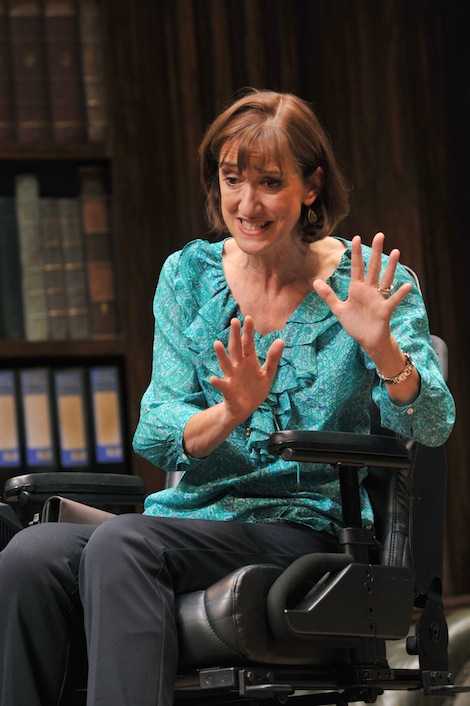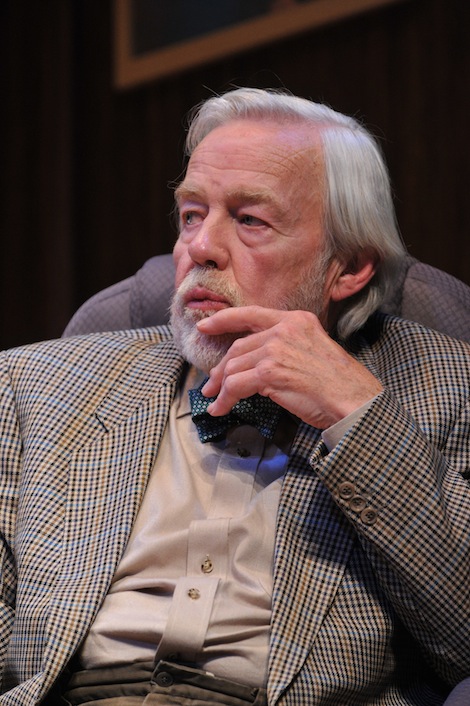 Abraham Lincoln
If given the truth, the people can be depended upon to meet any national crisis...
Abraham Lincoln
If given the truth, the people can be depended upon to meet any national crisis...
 Guildford news...
for Guildford people, brought to you by Guildford reporters - Guildford's own news service
Guildford news...
for Guildford people, brought to you by Guildford reporters - Guildford's own news service
Review: Duet for One – Yvonne Arnaud
Published on: 6 Nov, 2012
Updated on: 6 Nov, 2012
By The Stage Dragon
Intense, that is the only one word that can describe the experience of watching Duet for One. It is impossible to tear your eyes away from this play. The play might have only two characters, who talk for almost three hours, without much movement or any scenery and lighting changes but every moment is part of a fascinating journey.
The story is told of Stephanie Abrahams (played by Haydn Gywnne), a talented professional violinist who is diagnosed with multiple sclerosis and her sessions Over a period of months, with psychiatrist Dr Feldmann (played by William Gaunt.) The play is part of a national tour which is visiting the Yvonne Arnaud until Saturday November 10th.
The most striking thing about this play, is the direction the story takes. Instead of a standard, triumphant ‘mind-over-matter’ plotline, where a distressed woman with a life altering illness learns to appreciate life again, this play takes a much more interesting approach which reflects the ambivalence of real life.
When we first meet Stephanie, she seems to be coping quite well, with a logical and positive outlook. She appears to have accepted she can no longer play the violin and must make alternative plans to keep busy, which she begins doing by training to be her composer husband’s secretary, and teaching young gifted musicians.
However as the play goes on, we begin to see Stephanie has not acknowledged, and properly dealt with, her loss. By delving into her relationship with music, and the people closest to her, we realise that she has not accepted deep down what this loss means to her. As a result of this discovery her outlook on life becomes more bleak and she lives through many difficult emotions, which were sometimes heartbreaking to watch.
The end of the play is very ambivalent and having followed Stephanie through many emotions, we are left unsure where she will go next. However the last scene is incredibly touching, as although their relationship has been difficult Dr Feldmann promises that whatever comes, this will be a journey they will undertake together.
This ambivalence really encouraged you to think about the topics the play had explored, and the effect diseases like this must have, especially for people with such a pronounced calling in life. Although the psychiatrist-patient relationship is a template which has been used in many stories before, and perhaps even in this one did rely on a few clichés, it was an absorbing relationship to follow.
The story was backed up by exemplary acting. Haydn Gwynne had a very difficult role to play, as Stephanie not only talks for the majority of the play, with little prompting from Dr Feldmann, but experiences a large range of emotions. Gwynne rose to the challenge exceptionally and was a joy to watch. The only flaw in her performance was a lack perhaps of the very physical side effects of MS. Although she spent most of the play in a wheelchair, not much else signalled the physical effects the disease would have had on her.
William Gaunt also acted a difficult role very well. For most of the play it seemed that he was only a prompt, who bought out the emotions it was so hard for Stephanie to acknowledge, with the occasional humorous remark when she tried to fight him. However by the second half, he suddenly delivers an uncharacteristically heartfelt soliloquy that completely silences Stephanie and changes the whole dynamic of their relationship. This outburst is made even more compelling because we had not been able to decipher much of his character before.
Although the audience was quite small, it was understandable as bonfire night happened to coincide with the opening night. For such an absorbing play however, it did seem a shame and I hope the rest of the run brings many in to see this fascinating play.
Duet for One was a perfect example of how theatre really excels at exploring complicated emotions, in simple settings that in any other medium might seem boring and slow moving. However, being in a theatre and watching the story unfold with the characters right there before you, gave the story a level of emotional intensity that was a unique experience. It runs until Saturday, November 10th.
Responses to Review: Duet for One – Yvonne Arnaud
Leave a Comment Cancel reply
Please see our comments policy. All comments are moderated and may take time to appear. Full names, or at least initial and surname, must be given.
Click on cartoon for Dragon story: Public Asked for Views on SCC’s Proposal for Reduced Speed Limits



Recent Articles
- SCC Calls on the Government To Protect the Environment
- Two-Week Road Closure on Portsmouth Road for Gas Network Upgrade
- Charlotteville Cycle Club Organises Another Successful Cycle Race Event
- Waverley Council To Bring Green Space Maintenance In-house
- A New Dementia Centre for Guildford
- Lib Dems Easily Hold Three Council Seats in Surrey By-elections
- UK Students to Launch International Space Mission
- New Skate Park Proposed for Cranleigh
- Retrofit Planned for Guildford Office Building
- Museum Shines a Light on Victorian Send, Ripley and Pyrford



Recent Comments
- Richard Cooke on Letter: Snail-paced Progress for Full Weir Repair
- Bethan Moore on Guildford’s First “Bike Bus”
- Andy Friend-Smith on Guildford’s First “Bike Bus”
- Peter Mills on Guildford’s First “Bike Bus”
- Des Flanders on Making History As Pewley School’s Class of ’54 Hold Their Final Reunion
- Margaret Rotherham on Guildford Festival Burst with Colour, Culture and Community Spirit
Search in Site
Media Gallery
Dragon Interview: Local Artist Leaves Her Mark At One of England’s Most Historic Buildings
January 21, 2023 / No Comment / Read MoreDragon Interview: Lib Dem Planning Chair: ‘Current Policy Doesn’t Work for Local People’
January 19, 2023 / No Comment / Read MoreA3 Tunnel in Guildford ‘Necessary’ for New Homes, Says Guildford’s MP
January 10, 2023 / No Comment / Read More‘Madness’ for London Road Scheme to Go Ahead Against ‘Huge Opposition’, Says SCC Leader
January 6, 2023 / No Comment / Read MoreCouncillor’s Son Starts Campaign for More Consultation on North Street Plan
December 30, 2022 / No Comment / Read MoreCounty Council Climbs Down Over London Road Works – Further ‘Engagement’ Period Announced
December 14, 2022 / No Comment / Read MoreDragon Interview: GBC Reaction to the Government’s Expected Decision to Relax Housing Targets
December 7, 2022 / No Comment / Read MoreHow Can Our Town Centre Businesses Recover? Watch the Shop Front Debate
May 18, 2020 / No Comment / Read More








Linda York
November 14, 2012 at 4:02 pm
I was at this performance and agree with most the review, the only part I would slightly disagree with is: “The only flaw in her performance was a lack perhaps of the very physical side effects of MS. Although she spent most of the play in a wheelchair, not much else signalled the physical effects the disease would have had on her.”
When she went for the glass of water she used both hands and guided one with the other, she lifted her leg with hands when getting back in the wheelchair and on several occasions she rubbed her arms, legs and hands.